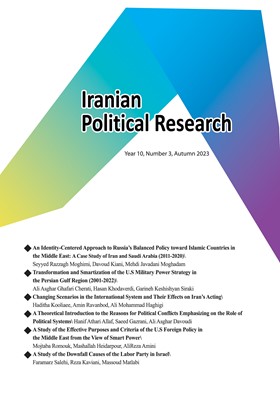Transformation and Smartization of the U.S Military Power Strategy in the Persian Gulf Region (2001-2022)
Subject Areas : Iranian Political Research
Ali Asghar Ghaffari Cherati
1
,
Hasan Khodaverdi
2
*
![]() ,
Garineh Keshishyan Siraki
3
,
Garineh Keshishyan Siraki
3
![]()
1 - Ph.D., Department of Political Science and International Relations, South Tehran Branch, Islamic Azad University, Tehran, Iran
2 - Assistant Professor, Department of Political Science and International Relations, South Tehran Branch, Islamic Azad University, Tehran, Iran
3 - Associate Professor, Department of Political Science and International Relations, South Tehran Branch, Islamic Azad University, Tehran, Iran
Keywords: Smart Power, Soft power, U.S, Foreign policy, military power, hard power, Iran, Persian Gulf, international relations,
Abstract :
The present study aims to answer how transformation and smartization of the U.S military power strategy has been conducted in the Persian Gulf region since 2001. The research relies on the hypothesis that consequences and high costs of the U.S military strategies during the presidency of George W. Bush, under the influence of hard power, made later presidents in the country to follow the strategy of smart power. Along with military presence, they also attempted to rebuild the U.S deteriorated image in the Middle East and the Persian Gulf region by some strategies like diplomacy, trade, foreign assistance, and propagation of their values. The research method was content analysis and the results showed that consequences of the U.S military intervention in the Persian Gulf revealed strategic limitations of Washington’s hard power policy during the Bush presidency. Thus, Barack Obama and later presidents in the country emphasized on the simultaneous use of hard and soft power, under the title of smart power. Although their approaches were different, their most important smart and common objective was to intelligently change power balance in the Persian Gulf region, in favor of the U.S and against Iran, by coalition between Israel and Arabic countries especially Saudi Arabia and UAE in the region.
برقافکن، مجید (1393). مقایسه تطبیقی سیاست جرج بوش پسر و باراک اوباما در قبال پرونده هستهای ایران. پایاننامه کارشناسی ارشد. دانشگاه آزاد اسلامی واحد خرمآباد.
پورحسن، ناصر؛ قنبری، لقمان؛ رضایی، زهرا (۱۳۹۷). بازشناخت راهبرد قدرت هوشمند دولت اوباما علیه جمهوری اسلامی ایران. مجلس و راهبرد، 25(95)، ص342-348.
جنیدی، رضا؛ ملایی، مسعود (۱۳۹۸). راهبردهای مبتنی بر قدرت نرم جمهوری اسلامی ایران در مقابله با قدرت هوشمند آمریکا. راهبرد سیاسی، 3(8)، ص89-65.
جوادی ارجمند، محمدجعفر؛ پرهیزگار، امین؛ خضری، احسان (۱۳۹۵). سیاست خارجی باراک اوباما در غرب آسیا و شمال آفریقا تا سال ۲۰۱۵. مطالعات روابط بینالملل، 9(36)، ص68-86.
رایس، دنیس (1401). راهکار دنیس رایس به بایدن برای ایجاد بازدارندگی در قبال ایران. قابل دسترس در:
https://mdeast.news/2022/07/09/
سلیمانی پورلک، فاطمه (1389). قدرت نرم در استراتژی خاورمیانهای آمریکا. تهران: پژوهشکده مطالعات راهبردی.
صفوی، سید رحیم؛ شیخیانی، عبدالمهدی (۱۳۹۷). اهداف کوتاهمدت و بلندمدت آمریکا در تهاجم نظامی به افغانستان. جغرافیای انسانی، 2(3)، ص24-1.
قربان اوغلی، جاوید (1401). متن و حواشی سفر بایدن به عربستان. قابل دسترس در:
https://www.sharghdaily.com/fa/tiny/news-851050
قربانی شیخنشین، ارسلان؛ حدادزند، شیرین (۱۳۹۹). مقایسه تطبیقی قدرت هوشمند چین و آمریکا در آفریقا. روابط خارجی، 12(4)، ص551-580.
متقی، ابراهیم؛ افخمی، امید؛ عسگرخانی، ابومحمد (۱۳۹۸). بررسی روابط ایران و آمریکا از منظر مؤلفههای قدرت هوشمند. سیاست دفاعی، 27(107)، ص145-170.
محمودی، زهرا (1399). تحلیل مذاکرات صلح از منظر استراتژیهای آمریکا در افغانستان. قابل دسترس در:
https://www.iess.ir/fa/analysis/2248/
مسعودی، حیدرعلی (1399). جو بایدن و رمزگان عملیاتی در حوزه سیاست خارجی. رهیافتهای سیاسی و بینالمللی، 12(2)، ص95-112.
نیازهای مشترک؛ رابطه عربستان و آمریکا در دوران اوباما. پایگاه تحلیلی خبری مشرق نیوز (1395). قابل دسترس در: https://www.mashreghnews.ir/news/680575
Armitage, R. & Nye, J. (2007). A smarter, more secure America. Csis Commission on Smart Power, Center for Strategic and International Studies. Available at:
https://carnegieendowment.org/files/csissmartpowerreport.pdf.
Dargiel, J. (2009). Smart Power: A change in U.S. diplomacy strategy. E-International Relations. URL= https://www.e-ir.info/pdf/1612.
Frykskog, L. (2021). Soft Power Enables the Exercise of Hard Power. Swedish Defence University. URL= https://www.fhs.se/en/swedish-defence-university/stories/2019-12-09-soft-power-enables-the-exercise-of-hard-power.
Gresh, G. (2015). Gulf Security and the U.S. Military. California, Stanford University Press. at: https://www.sup.org/books/title/?id=23177
Harley, S. (2021). Hard Power, Soft Power and Smart Power: Civilian-Military Challenges in Counterterrorism First Edition. Ankara: Centre of Excellence Defence Against Terrorism (COE-DAT).
Ivanov, I. (2020). Reshaping U.S. Smart Power: Towards a Post-Pandemic Security Architecture. Journal of Strategic Security, 13(3), p.46-74.
Katzman, K. (2018). Afghanistan: Post-Taliban Governance, Security, and U.S. Policy. Congressional Research Service. Available at: https://sgp.fas.org/crs/row/RL30588.pdf.
Lindsay, J. (2011). George W. Bush, Barack Obama and the Future of US Global Leadership. International Affairs, 87(4), p.765-779. https://doi.org/10.1111/j.14682346.2011.01003.x.
Namura, D. & Phillip, A. (2017). Trump Announces New Strategy for Afghanistan that Calls for a Troop Increase. The Washington Post, August, 21,
at: https://www.washingtonpost.com/politics/trump-expected-to-announce-small-troop-increase-in-afghanistan-in-prime-time-address/2017/08/21/eb3a513e-868a-11e7-a94f-3139abce39f5_story.html
Nye, J. (2007). Get Smart: Combining Hard and Soft Power. Foreign Affairs, 88(4), p.160-164. http://doi.org/10.1093/oxfordhb/9780199588862.013.0031.
Nye, J. (2009). Smart Power. New Perspectives Quarterly, 26(2), p.7-9.
https://doi.org/10.1111/j.1540-5842.2009.01057.x.
Orion, A. & Montgomery, M. (2021). Moving Israel to CENTCOM: Another Step In to the Light. Available at: https://www.washingtoninstitute.org/policy-analysis/moving-israel-centcom-another-step-light
Peterson, J & Pollack, M. (2003). Europe, America, Bush: Transatlantic relations in the twenty-first century. Taylor & Francis eBooks. https://doi.org/10.4324/9780203208014.
Rugh, W. (2013). Obama`s Policy Towards Syria. The Fletcher Forum of World Affairs, 37(3).
Simons, G. (2021). Hard and Soft Power Approaches to Armed Conflicts: The United States in Iraq and Russia in Syria. Institute for Russian and Eurasian Studies, 19(2), p.86-110.
Vasile, S. (2020). The Usa and Smart Power Policy. Romanian Military Thinking, Special Issue, (4), p.188-199.
_||_
